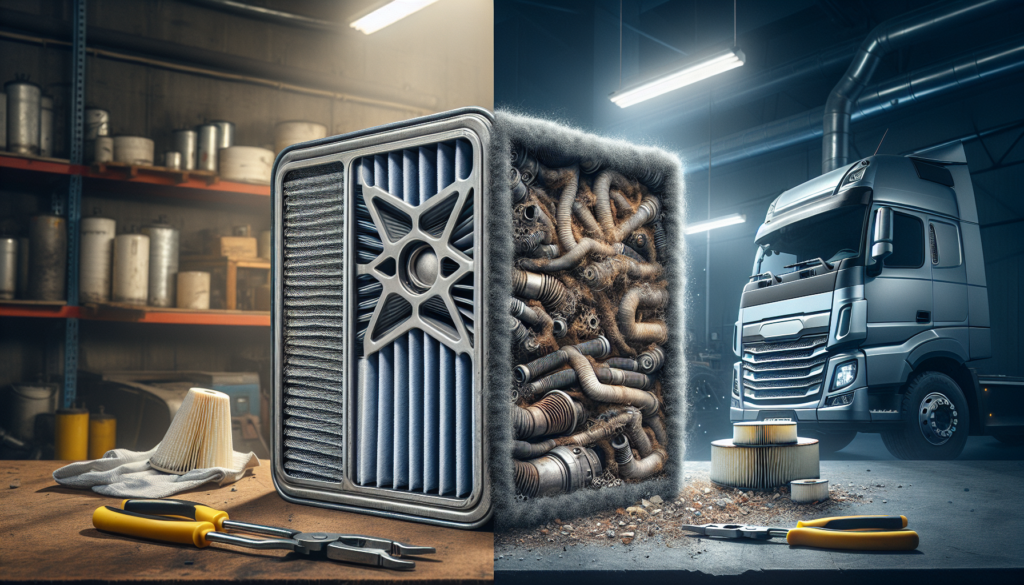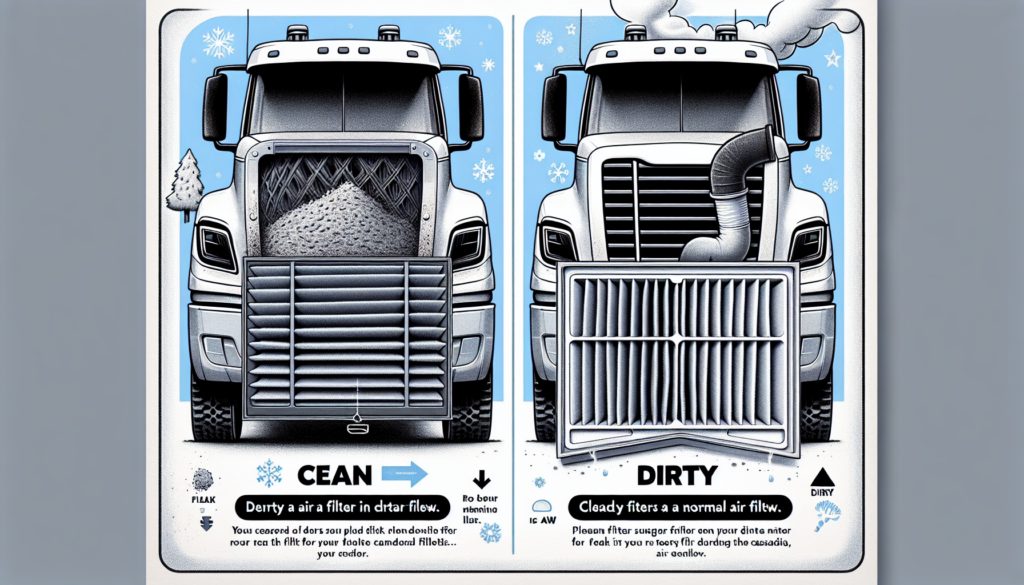
It’s a surprisingly common question you may be asking yourself – could a dirty air filter in your Cascadia be affecting the heater’s performance? This article aims to break down the nitty-gritty behind the link between the cleanliness of your air filter and the performance of your heater, considering the critical part air filters play in determining the efficacy of heating systems in vehicles. You’ll gain valuable insight into maintaining the optimal functionality of heating systems in your Cascadia, especially during those nippy winter months. So, buckle up as we explore the complexities of this seemingly simple issue that could make a world of difference in your driving comfort.
Understanding the Role of Air Filters in Cascadia Trucks
When it comes to the functionality and performance of your Cascadia truck, it’s crucial to understand the significant role played by the air filter. The air filter is tasked with preventing dust and debris from entering your vehicle’s engine. This safeguarding allows your truck to function smoothly and enhances the engine’s lifespan.
Purpose of the Air Filter
The air filter acts as the truck’s respiratory system, allowing your engine to breathe cleaner air. Without a functional air filter, pollutants such as dirt, dust, and other airborne particles can wreak havoc on your engine, potentially damaging it or reducing its performance. Clean air is an essential component for the internal combustion process, which ultimately powers your truck.
Types of Air Filters Used in Cascadia Trucks
Cascadia trucks use primarily two types of air filters – paper and reusable. Paper air filters are generally cost-effective and work efficiently to trap particles, but they require frequent replacements. On the other hand, reusable air filters made of fabric or oil-soaked cotton offer greater durability, but they necessitate regular cleaning.
Air Filter Location and Airflow Path
In most Cascadia trucks, the air filter is located within the engine compartment. The airflow path begins at the air intake, where air is drawn into the system. This air then passes through the air filter, where pollutants and debris are trapped, before entering into the engine’s combustion area.
Basics of Heater Function in Cascadia Trucks
To keep you comfortable in colder weather, Cascadia trucks are equipped with state-of-the-art heating systems. Understanding how your heater works can help you maintain it more effectively.
Components of the Heating System
The heating system in your Cascadia truck comprises key components such as the heater core, blower motor, and HVAC controls. It takes the warm coolant from the engine, diverts it through the heater core, and uses the blower motor to push warmed air into the cabin of your vehicle.
How the Heater Utilizes Airflow
The heater utilizes airflow from the engine to warm the air before sending it into the cabin. The cleaner the air, the more efficiently the heater can operate, emphasizing the importance of a clean air filter in ensuring optimal heater performance.
The Relationship Between Air Quality and Heater Efficiency
The quality of the air entering into your heating system greatly impacts its efficiency. A dirty or clogged air filter can restrict airflow and sabotage your heater’s performance, leading to a chilly drive on a cold day.

Symptoms of a Dirty Air Filter
Knowing the symptoms of a dirty air filter can help you rectify the issue before it affects your vehicle’s performance or damages other components.
Visual Indicators of a Dirty Filter
One of the most apparent signs of a dirty filter is its color. An air filter that requires changing will often be gray or black due to trapped pollutants.
Reduced HVAC Efficiency
Another common symptom of a dirty air filter is a decrease in HVAC efficiency. You may notice that your cab takes more time than usual to cool down or heat up. This happens because a clogged filter restricts the airflow necessary for efficient temperature control.
Possible Odors and Reduced Air Quality
A dirty air filter can also cause unpleasant odors in your vehicle’s cabin. This is usually because it’s no longer effectively filtering out pollutants, which can decrease the overall air quality inside the cab.
Impact of a Dirty Air Filter on Heater Performance
The air filter plays a critical role in your heater’s performance. Improper maintenance of the air filter can lead to multiple issues with your heating system.
Restricted Air Flow
When an air filter becomes clogged with dirt and debris, it significantly restricts the amount of air flowing to the engine and heating system. This can result in reduced heater effectiveness and a less-than-comfortable drive during colder months.
Reduced Heating Capacity
A dirty air filter can reduce the heating capacity of your truck. With inadequate air flow, your heater might struggle to warm up the cab effectively, turning your cozy drive into a chilly experience.
Potential for Overheating of Heater Components
By restricting airflow, a dirty air filter can lead to other components of the heater working harder to compensate. This overworking can lead to overheating, placing undue stress on the system and potentially shortening its lifespan.

How Air Filters Affect Fuel Economy and Emissions
Your air filter doesn’t just affect your engine and heater’s performance – it also impacts your truck’s fuel economy and emissions.
The Link Between Air Filters and Engine Performance
The air filter is pivotal to the engine’s performance. A clean filter allows for optimal air flow and fuel mixture for combustion, contributing to efficient engine performance. Conversely, a dirty air filter can undermine your engine’s efficiency which can ultimately reduce your fuel economy.
Impact on Fuel Efficiency
With a dirty filter restricting airflow to the engine, your truck may consume more fuel to compensate for the diminished power. As a result, you may find yourself needing to refuel more frequently, which can add considerably over time to your vehicle operating costs.
Emission Levels and Environmental Consideration
A well-maintained air filter can also help lower your truck’s greenhouse gas emissions. With an efficient running engine, less fuel is consumed, and consequently, less CO2 is emitted. Maintaining a clean air filter aligns with the collective efforts towards reducing our environmental footprint.
Regular Maintenance of Air Filters in Cascadia Trucks
Regular inspection and maintenance of your vehicle’s air filter is non-negotiable for optimal performance.
Recommended Maintenance Schedule
Typically, it’s recommended to check the air filter every 10,000 to 15,000 miles, or at least once a year. However, if your truck operates in dusty conditions, you may need to check and replace the filter more frequently.
Checking the Air Filter Condition
Checking the air filter condition is quite straightforward. Remove the filter and hold it up to a light source. If you can’t see light easily passing through it, it’s probably time to replace your filter.
Steps for Changing a Dirty Air Filter
Changing a dirty air filter is a simple process that you can typically handle yourself. First, locate the air filter in your engine compartment. Once located, remove the old filter and clean the filter housing if required. Finally, insert the new filter and secure the housing. Make sure to follow the specific instructions for your Cascadia model.

Diagnostics for Assessing Heater Problems beyond the Air Filter
Although a dirty air filter can negatively impact your truck’s heating system, it isn’t the only potential source of problems.
Troubleshooting Other Components of the Heating System
Should you continue experiencing heating system problems after replacing your air filter, it may be necessary to troubleshoot other system components. These may include the heater core, blower motor, or HVAC controls. Always refer to your truck’s manual or seek professional help if necessary.
Professional Diagnostic Tools and Techniques
Heating system professionals utilize advanced diagnostic tools and techniques to identify issues accurately. They may use multimeters to check electrical components, pressure testers for the cooling system, and other specialized equipment to evaluate your heater’s performance.
When to Seek a Mechanic’s Expertise
If basic troubleshooting doesn’t resolve the heating problem, it’s time to seek a mechanic’s expertise. Continued problems may be indicative of a more serious issue that could potentially cause more damage if left unchecked.
The Cost of Neglecting Air Filter Maintenance
Failing to maintain your truck’s air filter properly can lead to various long-term problems, all of which could cost you significantly more than a simple filter change.
Long-term Impact on Truck Performance
Neglecting air filter maintenance can adversely affect your truck’s overall performance. Diminished horsepower, reduced fuel economy, and an inefficient heating system are all potential consequences of a dirty and clogged air filter.
Increased Maintenance and Repair Costs
System inefficiencies due to a dirty air filter can lead to other components experiencing damage or premature wear. Over time, you might find yourself dealing with increased maintenance and repair costs that could have been avoided with regular air filter changes.
Implications for Driver Comfort and Safety
A dirty air filter not only affects the functionality of your truck’s heater but could also compromise the overall air quality in your cabin. For the driver, this could lead to discomfort or potentially harmful exposure to pollutants. Regular filter changes can help ensure your driving comfort and safety.

Choosing the Right Replacement Air Filter for Your Cascadia
When it’s time to replace your air filter, choosing the right replacement is crucial.
OEM vs. Aftermarket Air Filters
You’ll generally be choosing between Original Equipment Manufacturer (OEM) or aftermarket air filters. OEM filters are designed specifically for your vehicle, ensuring optimal fit and performance. Conversely, aftermarket filters can be less expensive and offer a wider variety of products to choose from. Both options can be suitable, depending on your specific needs and budget.
Importance of Selecting High-Quality Filters
Regardless of whether you opt for OEM or aftermarket, it’s vital to select high-quality filters. Lower-quality filters may not filter air as effectively, potentially leading to faster wear and tear on your engine and heating system.
Where to Purchase Replacement Filters
Replacement air filters for your Cascadia truck are readily available at most auto parts stores and online retailers. You can also find them at specific truck dealerships. Before purchasing, make sure to verify that the filter matches your truck model’s specifications.
The Interconnectedness of Truck Systems: Air Filter, Heater, Engine, and Beyond
Understanding the interconnectedness of your truck’s various systems enables you to see why maintaining each component is crucial for the overall performance of your truck.
How Different Truck Systems Rely on Clean Air Filters
Clean air filters play a pivotal role not only in engine health but also in maintaining a smoothly operating climate control system and contributing to efficient fuel combustion. Thus, a single neglected air filter can potentially impact multiple systems within your truck.
The Domino Effect of a Malfunctioning Heating System
A malfunctioning heating system can be a symptom of a clogged air filter. As the heating system struggles to perform efficiently, this can lead to an overworked engine—which, in turn, affects fuel consumption rates, overall vehicle power, and even the lifespan of the engine itself.
The Importance of System-Wide Maintenance
The complex interconnectivity among your Cascadia truck’s systems underscores the importance of regular, system-wide maintenance. By taking care of all the different components, starting with something as simple as the air filter, you can help ensure the longevity and performance of your truck.
